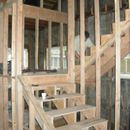Insulation of concrete walls (above and below grade)
Hello,
My wife and I, after a lengthy search, have finally found a house that meets our wants and needs. However, I have one potentially serious concern, and that regards how the contractor insulated at least some of the 1922 home’s concrete walls in the recent to-the-studs renovation. To be clear, in addition to the basement, this home has above-grade concrete walls as well (with a stucco exterior). I’m attaching a picture to show a portion of the main floor when taken down to the studs.
Fearful about the potential for moisture/condensation issues, I inquired with the owner about insulation techniques used. She contacted the contractor, and this was his reply:
“The insulation that we installed on the 2x furred out area of the concrete walls is fiberglass batt insulation with interior vapor barrier. These areas include the West wall, the North wall from the kitchen to west end of the house. The exterior of the home was painted with a masonry specialized paint which intent was to seal the stucco. The combination of both is intended to prevent moisture migration from either the exterior or the interior of the building envelope depending on the relative pressure differences. I would forecast with the updated ventilation systems and the insulation upgrades throughout the house that moisture of condensation would not occur. We did not find any evidence of moisture in the original house assemblies which included blown in insulation in the wall cavities.”
As far as climate zone goes, we are in Portland, Oregon, which I believe is categorized as 4/Marine under the Building America guidelines.
My gut reaction, based on what I’ve read on this site and others in the past, is that I should probably take a pass on this house, due to the potential for moisture and rot issues, with the batt/vapor barrier combination with concrete walls. I’m particularly concerned about the vapor barrier. Am I correct in my thinking, or am I worrying too much?
Thank you very much for any guidance you can provide!
Best regards,
Doug
GBA Detail Library
A collection of one thousand construction details organized by climate and house part










Replies
Doug,
The contractor used a method that I wouldn't recommend. There could be problems with the below-grade concrete walls with interior fiberglass insulation. There could also be problems during the summer with the above-grade walls, especially if the home is air conditioned.
The contractor mentioned an "interior vapor barrier." If that means polyethylene, this house could very easily have summer moisture problems if it is air conditioned.
On the other hand, it's also possible that this home will avoid problems. There are a great many variables at work. The best thing we can say is that the chosen insulation was risky.
Martin,
Thank so much for your reply.
I'm actually not entirely sure about if/how the contractor insulated the basement. I do know his response at least applies to portions of the above-grade concrete walls. However, I'm unsure as to what he used as an "interior vapor barrier," although I intend to find out. What, if any, would be an acceptable vapor barrier in this case?
I understand from your blog post on insulating basements (https://www.greenbuildingadvisor.com/blogs/dept/musings/how-insulate-basement-wall)
that the preferred insulation method in that case would be closed-cell spray foam or rigid foam. Can you tell me what the preferred route would be for above-grade concrete walls? It seems a bit more complicated in that case, due to the studs embedded in the concrete wall. I almost wonder if any insulation choice could increase the odds of those experiencing rot.
Thanks again. I very much appreciate your advice.
Doug
Doug,
Q. "Can you tell me what the preferred route would be for above-grade concrete walls?"
A. The best insulation would be rigid foam or spray foam, and the best location for the insulation would be on the exterior side of the wall.
Thanks, Martin.
I also just came across your article on insulating brick walls, which seems have some applicable information.
https://www.greenbuildingadvisor.com/blogs/dept/musings/insulating-old-brick-buildings
Best regards,
Doug